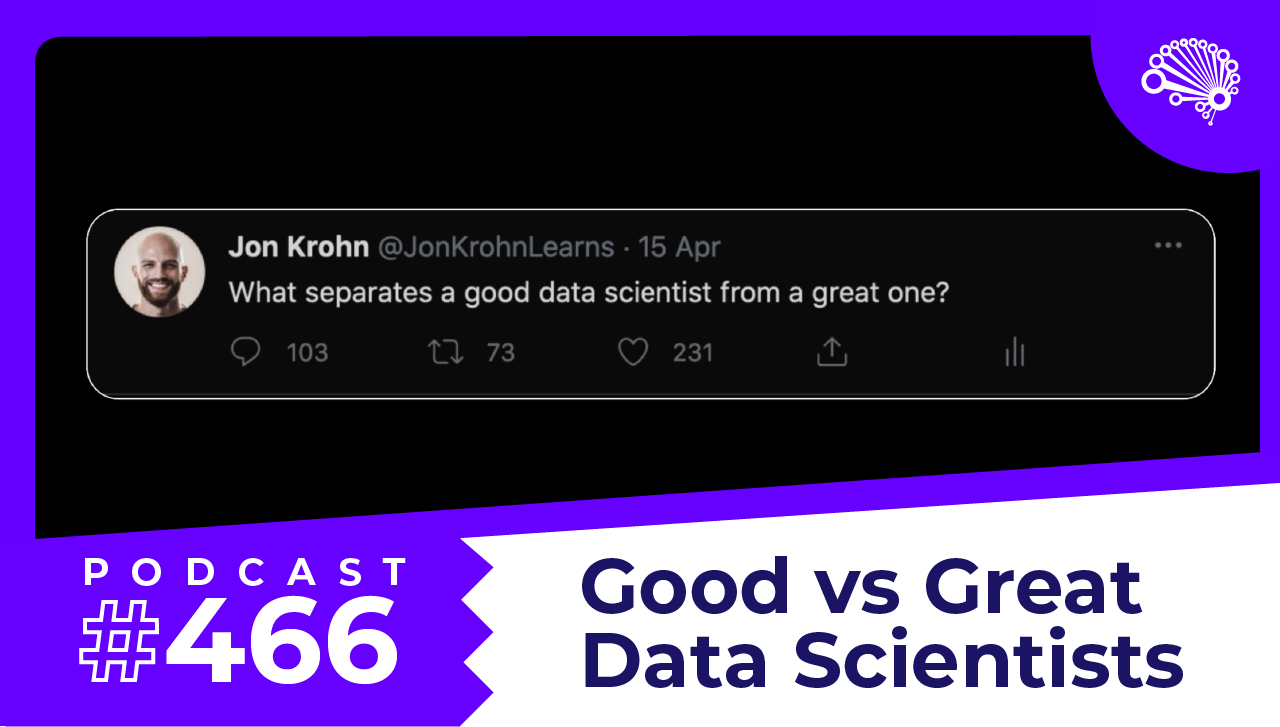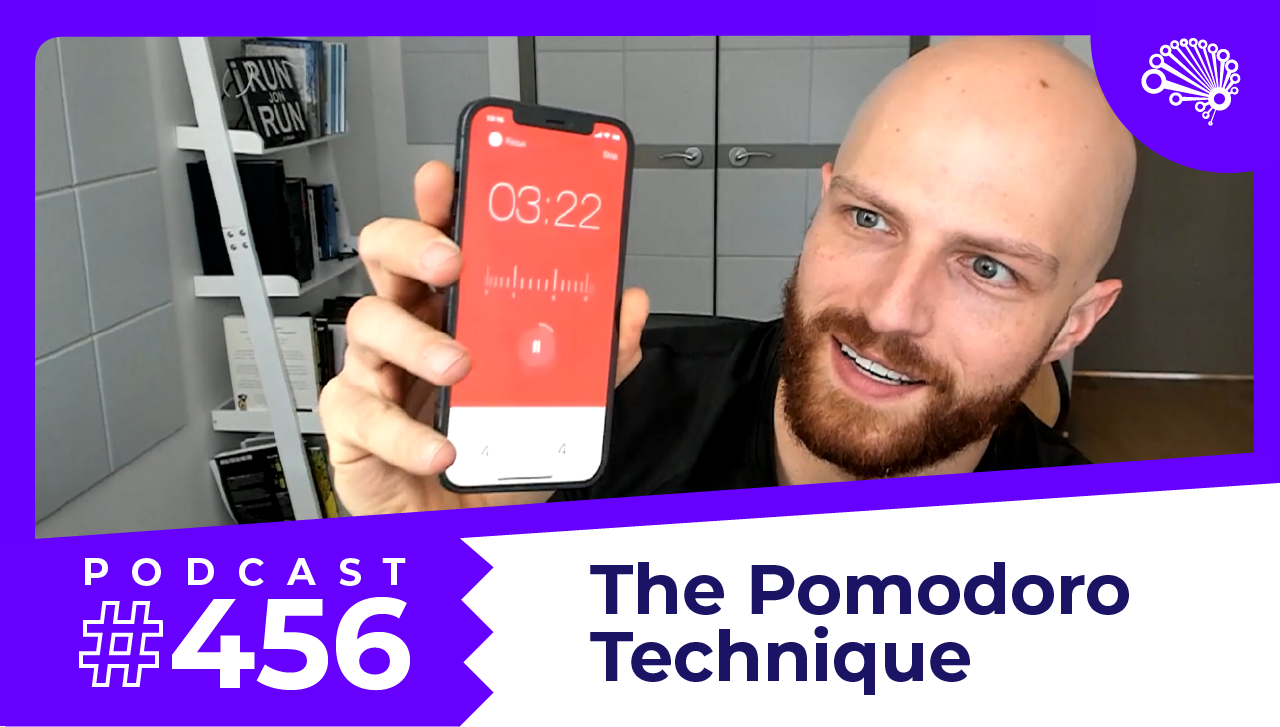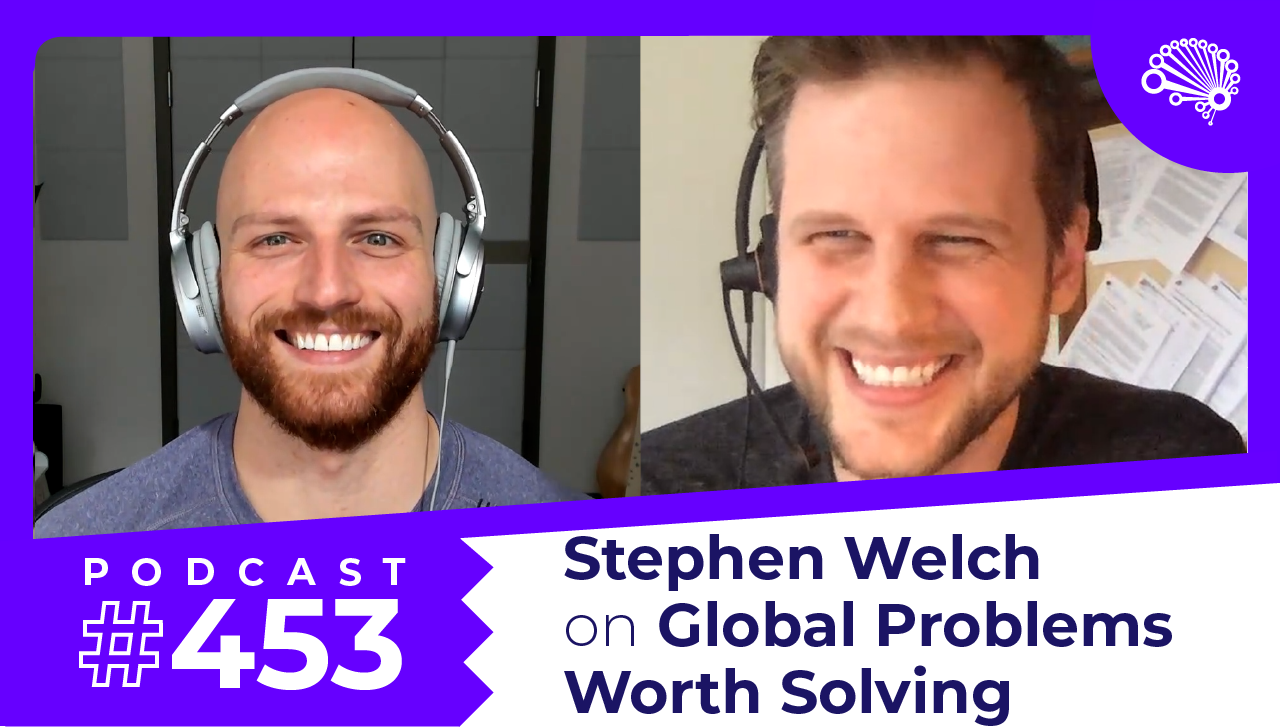In today's always-connected world, it's easy to get caught up in thought after thought after thought. For Five-Minute Friday this week, here's a trick to jolt yourself into the present and bask in the simple appreciation of being alive.
Listen or watch here.
Filtering by Category: Personal Improvement
The Price of Your Attention
Time is money. Every second of your life is yours to use and one of the options you have is to generate income. You can do this hourly, or, as a data scientist, invest time in a digitally-sharable product with a huge potential ROI.
Listen or watch here.
Financial Data Engineering
This week's guest is Doug Eisenstein, an exceptionally clear and content-rich communicator. He fills us in on the complexity of engineering a coherent source of truth for financial models, integrating hundreds of data sources.
Topics covered in the episode include:
• A breakdown of the primary financial sectors and departments
• Why data source integration for finance is wildly complicated
• Specific data engineering approaches that resolve these issues including entity resolution, knowledge graph mapping and tri-temporality.
20 years ago, Doug founded the consulting firm, Advanti and they have since become a critical provider of solutions to complex data engineering problems faced by some of the world's largest banks and asset managers including Morgan Stanley, Bank of America, Citibank and State Street.
Listen or watch here.
Continuous Calendars
Extremely practical post for you today! It's on the Continuous Calendar, which in my opinion is vastly superior to the standard monthly calendar in every imaginable respect. Click through for more detail.
Five Keys to Success
I've recently been able to achieve markedly better results than ever before across my personal and professional lives. For Five-Minute Friday, I reflect on five keys to success that may allow achievement of many complex, long-term goals.
You can listen or watch here.
Peer-Driven Learning
"Peer-driven" learning — where you are formally taught by your coworkers — not only results in team members learning key new skills, but can have added benefits like team bonding, confidence, and innovation. Something to try!
Today's episode is directly inspired by a LinkedIn post by Laura Rodriguez. She tagged me in the post, citing a SuperDataScience episode on communication and relating it to her workplace at ForwardKeys. Thank you, Laura!
99 Days to Your First Data Science Job
He's BAAAAACK! Kirill Eremenko is the GUEST on the SuperDataScience show for the first time. In this episode, he details his exceptional new learning pathway that enables folks to land their first data science job in 99 days.
We also cover:
• What Kirill's been up to; life philosophies he's honed
• 5 myths holding people back from starting a data science career
• 5 items you need to land a data science job
Kirill created the SuperDataScience podcast in 2016 and hosted the program (over 400 episodes!) until passing the torch to yours truly on January 1st.
Kirill also founded the SuperDataScience company and is the firm’s CEO today. SuperDataScience.com, the namesake of this podcast, is a comprehensive online education platform for data science and related data specializations. Through SuperDataScience.com and his Udemy courses, Kirill has taught well over a million students worldwide, launching countless data science careers.
You can listen or watch here.
Good vs. Great Data Scientists
What separates a good data scientist from a great one? I asked this on Twitter recently and received hundreds of replies — some witty, others very thoughtful. For today's Five-Minute Friday episode, I review and summarize the thread.
The Tweet has had a crazy 7k engagements on 220k impressions so far — evidently it's a topic that lots of people have an opinion on. I highlighted some of my favorite individual replies in the video, including those from Martin Goodson, Chris Albon, Brandon Rohrer, Chelsea Parlett-Pelleriti, and Isabella Ghement.
What do you think? Let me know if I missed anything important!
You can listen to or watch my video summary here, or you can click through for the blog-post version.
The full Twitter thread is here if you'd like to dig through the entirety of the collective wisdom.
Read MoreAnalytics for Commercial and Personal Success
I believe the easiest way to attain success — in personal or professional endeavors alike — is to rigorously track and analyze the right data. Konrad Kopczynski is a master on this topic and he joins me for this week's guest episode.
Whether you're developing machine learning models, maximizing your company's profitability, or tackling a full-length Ironman triathlon, if you're disciplined about data collection, tracking, and reflection, you can iterate, improve, and achieve your dream state. This is a central tenet of my life and much of my ideology on it has been influenced by my near-decade-long friendship with Konrad.
Konrad is the founder and managing partner of impakt Advisors, a consultancy that specializes in harnessing data for, well, impact. They structure the various data sources into thoughtfully constructed data warehouses and then layer on top analytics, data-science models, and visualizations to enable real-time reports, dashboards, and predictions across all the key areas of a business, including digital marketing, customer retention, behavioral segmentation, and profit margin.
Listen to or watch here.
It Could Be Even Better
When something positive happens in my life, my mind tends to jump to the negative flipside right away. To fend this off, I now repeat to myself "It Could Be Even Better" when something good happens. The mental impact has been sublime.
For this week's Five-Minute Friday episode, I provide specific examples across my professional, fitness, and personal lives where repeating this "It Could Be Even Better" mantra has proved game-changing. If you too slip into negative thinking when something good happens, perhaps it's a simple trick that'll work for you too!
Watch the video above or click through for the full post.
Read MoreLanding Your Data Science Dream Job
This week, the inspiring Harpreet Sahota joins me on the SuperDataScience show to fill you in on how to land your data science dream job — whether it’s a more senior role or your first foray into the field.
Harpreet is an eminent contributor to the data science community. It's unbelievable how much he gives to world each week. He:
Hosts the The Artists of Data Science podcast
Is the principal mentor at Data Science Dream Job
Hosts weekly office hours that anyone can drop in on
With Kate Strachnyi, founded and hosts the inaugural (and forthcoming) Data Community Content Creator Awards
Despite all of the above, Harpreet's remarkably humble — and capital-S Stoic! Oh, and he has a day job too! He's the lead data scientist at Price Industries, a global industrial leader in HVAC manufacture, and in the episode he details for us data models he's built for them.
You can listen (or watch) here.
The Pomodoro Technique
I’ve experimented with a lot of productivity techniques and quantitatively track their effectiveness every day. One of my long-standing favorites is the Pomodoro Technique to eke creative, highly focused work out of minimal effort 🍅
You can listen to or watch today's Five-Minute-Friday episode on the Pomodoro Technique here.
In addition to Pomodoros, some other techniques I've covered on the podcast are mindfulness (here and here) and a number popularized by James Clear over the years (see here).
Big Global Problems Worth Solving with Machine Learning
In this week's episode, Stephen Welch joined me to discuss 10 big global problems worth trying to solve with data science and machine learning. Perhaps you'll be inspired to tackle one or two yourself!
2020 presented a lot of challenges to a lot of folks around the world. For Stephen, the challenging year was compounded by intense delivery targets for him and his team on a machine vision-enabled system that automatically detects defective industrial products. After delivering this fascinating edge-deployed software into production, Stephen was able to finally come up for air and he reflected on what's most important in one's life — culminating in his list of 10 global problems worth solving.
Stephen is VP of Data Science at Mariner, where he leads a team developing deep learning-based solutions to manufacturing problems. Prior to working with Mariner, Stephen was VP of Machine Learning at Autonomous Fusion, a firm specialized in self-driving cars. He’s also an adjunct professor at University of North Carolina at Charlotte and the creator of the gorgeous math-focused YouTube channel WelchLabs, which has over 200k subscribers and 10M views.
You can listen or watch here.
Yoga Nidra
This episode features the world-renowned yogi Steve Fazzari. He gives me (and you!) a crash course on Yoga Nidra, a practice of deep relaxation that impacts brain structure, leading to better sleep and ability to respond to stress.
Steve lives up in the mountains of British Columbia as an explorer and instructor of yoga instructors. A ravenous reader and critical thinker, he has a rich understanding of science, the body, and the mind. I learned a ton from Steve during the filming of this episode.
If you like the sound of his explanation (and two-minute demo of) yoga nidra, please let me know because I'd love to bring him back on the SuperDataScience show to lead us through a full-length yoga nidra session.
Data Science as an Atomic Habit
In 2013, I sat on a crowded bus next to a guy with the same (bald) haircut as me. Luckily, we struck up a conversation because that talk was the catalyst for a drastic, ever-developing U-turn across my entire life, both personally and professionally.
Following what he today calls the Atomic Habits approach, that guy on the bus -- James Clear -- now has a million subscribers to his weekly email newsletter and a New York Times #1-bestseller that's been translated into over 40 languages.
Via analogy to specific data science and software development examples, in today’s FiveMinuteFriday on the SuperDataScience Podcast I describe how “atomic habits” have the capacity to dramatically transform your career and your very identity.
Read MoreCommunicating Data Effectively
Things can get silly when Kate and I get together 🙃 BUT we also covered a lot in this week’s guest episode of the SuperDataScience, including:
The utter importance of communicating data effectively
Concrete tips for doing so
And how to build a giant social-media presence (like Kate's 150k following!)
Kate is the founder of Story by Data & DATAcated Academy, and author of four books including The Disruptors: Data Science Leaders and Journey to Data Scientist.
Listening/viewing options, as well as full transcript, available here.
Deep Learning for Machine Vision
In the latest SuperDataScience episode, the brilliant A.I. researcher Deblina Bhattacharjee fills me in on the state of the art in machine vision. From predicting earthquakes to 3D VR experiences based on ordinary 2D art, she's seemingly in on it all!
We also covered:
Automatic detection of biological cells in medical images
The typical workday of, and software tools used by, A.I. researchers working at the cutting edge
The critical math subjects necessary to be an outstanding machine learning practitioner (to my delight, she reeled off the subjects covered in my ML Foundations curriculum)
The ever-increasing utility of unsupervised learning approaches
Her top productivity tips (Deblina is unbelievably productive so I greatly value her two cents on this!)
Prog rock music
The intelligence of plants (yep, plants!)
This is an outstanding episode. I learned a ton while filming and had a lot of laughs too, so I think you'll enjoy it too.
Listening/viewing options, as well as full transcript, available here.
Tools for Sharpening Your Attention
This article is a combination of a two-part series from January 2021. You can listen to the first part here, and the second part here.
In any given workday, our goal is typically to get as much done as possible. Often, however, we spend the day feeling frazzled -- hopping reactively between multiple tasks, emails, texts, catch-ups with colleagues, and our physiological needs. By the end of the day, we feel worn out and we often didn’t accomplish all that we’d hoped to at the start of the day, even if we put in heroically long hours because we’re so committed to getting everything done.
Lying in bed after one of these long days, I often find myself thinking that it could have gone very differently…
Read More





